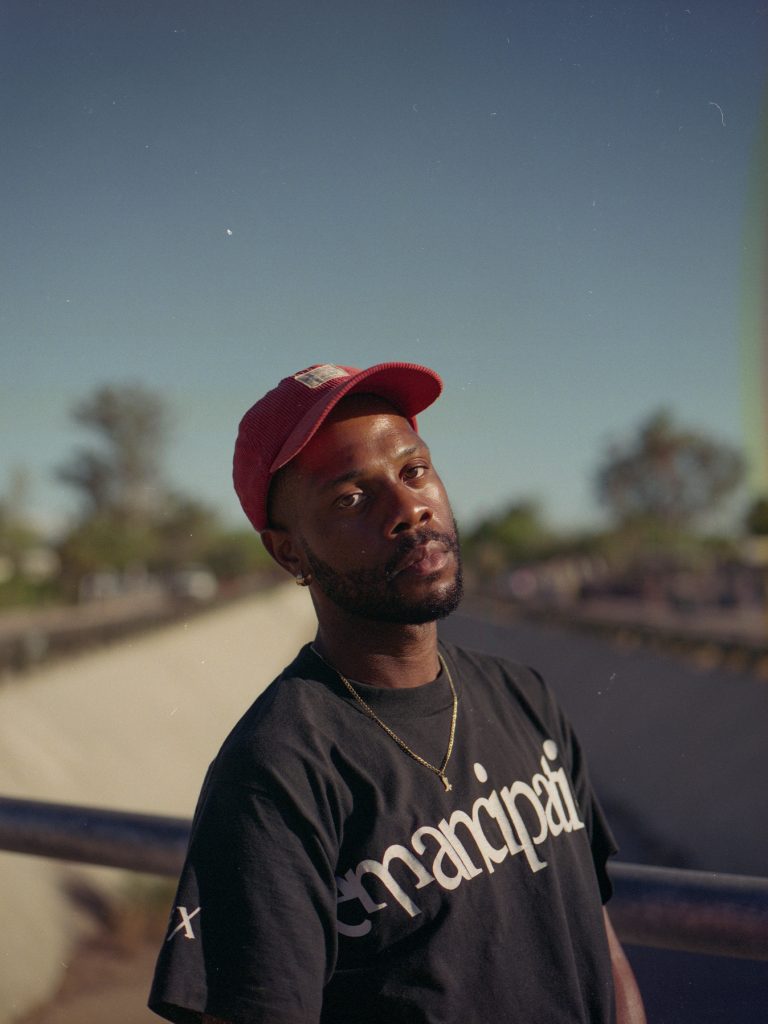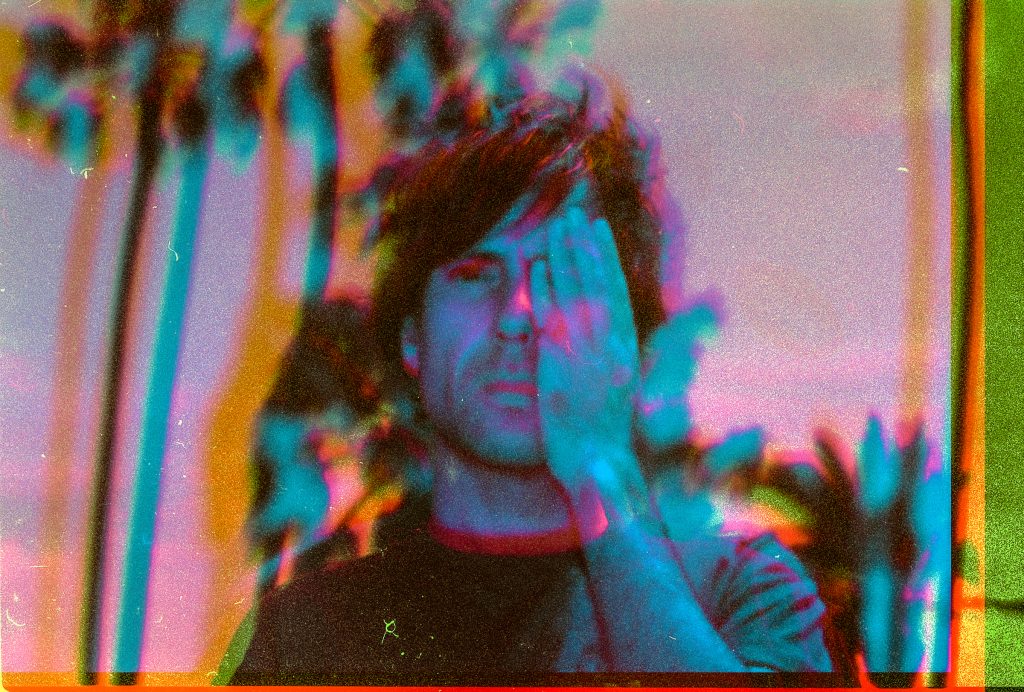
If Islands’ last record, (2021’s Islomania) was a Saturday Night Fever dream, then the follow up–And That’s Why Dolphins Lost Their Legs–is the Sunday Morning comedown.
“[Islomania] was exuberant and hopeful, and Dolphins is like the grim rejoinder,” songwriter Nick Thorburn says. “The songs attempt to tap into some of our darker impulses. The grim, unshakeable feeling that we live in hell, that there is no future, that all hope is lost. I wanted to explore those depths and see where it lead me.”
Hopelessness aside, the collection of songs represents a big leap forward. With addictive hooks at every possible turn, Dolphins (the 9th record in the catalogue), stands out as quite likely the strongest and most articulate Islands album yet. Nick Thorburn and band manage to slyly tap into both the pain and the joy of living, often simultaneously, while stripping the music down to its simplest element: a strange sample rubbing up against a bouncing bassline, a snappy kick and snare firing off against a persistent, hooky guitar line.
The music itself is settled on the spaces in between: the silences, the spareness. There’s an evocative wooziness within each song; a disorienting disassociation that draws you into its strange world.
“I was in my head/all my friends and all my lovers dead,” Thorburn sings on the second song, “And All You Can Do Is Laugh”. Ruminating on a world being destroyed before our eyes, Thorburn, sounding like an acquiescent ghost, continues on: “Something’s changed/ Something’s wrong/Something strange must be going on/Since it came/Things just aren’t the same/You see the light/Coming over the hill/From up in the sky/Like a thief they come in the night”. Where do you go from there?
Darker, it seems. And yet, always with a sense of humor. “Headlines” paints the picture of a feckless passenger in a car, helplessly careening into a tree during a volatile argument with a partner. But all the passenger can think about is how the event will be framed in next day’s papers. The paper’s headline: “Poor Tree, (Man Died).”
The writing process began a lot differently, though. Initially, Nick had no intention of writing songs in the way he knew how.
“During my time off from Islands, before releasing Islomania, I was finished with rock music, bored of the lyrics I was writing. I was toying with the idea of making…I’m embarrassed to say… beats.” Thorburn says, with a laugh. “I began tinkering at home, and quite quickly compiled a huge folder of instrumentals. I got together with my friend Fat Tony and we made a few songs together. But as things went along, I found myself getting increasingly excited by the possibility of a lyric here or there. At first it was just a hook, and then a verse. Before long, I was sitting on a big pile of Islands songs.”
The songs, though, are more idiosyncratic and off-kilter than Islands has sounded in a while. And that’s a good thing. Though refined and deliberate, the music has a certain playfulness that Thorburn hasn’t tapped into in quite some time. The record is a notable departure from previous outings, but the DNA of Thorburn’s early work, namely his first band The Unicorns, can clearly be heard throughout songs like “Headlines“, “Life’s A Joke” and “And All You Can Do is Laugh”.
Thorburn elaborates on one of the album’s main themes: “I was interested in the idea of regression. Evolution in the opposite direction, you know? We think of fish evolving by growing legs—walking out of the primordial swamp towards an enlightened existence—but what if things went the other way? What if a four legged dolphin took one look around, saw what humans had done, and said ‘fuck it, I’m going back in’?”
“And actually,” Thorburn says, “the title itself came from a conversation I overheard between a couple of strange men in a friend’s backyard in Los Angeles, one of whom insisted that dolphins did in fact evolve to have legs at one point, but very quickly returned to the ocean, going back the other way.”
While Dolphins began the journey at his home in Los Angeles, Thorburn eventually traveled to famed Hollywood studio Sunset Sound to work with Chris Coady (“Feel A Way”), upstate New York with Ratatat’s Mike Stroud (“Pelican”) and finally landing back in Los Feliz with producer Patrick Ford for the rest of the batch. This final stage in the process gave the songs their legs, allowing them the room to evolve out of the primal goo and live freely in the world.
And It was here that the light started shining through.
“This record is me at my most bleak, unquestionably,” Thorburn says. “But there’s a point to it all. It’s not just gleeful nihilism. With the song ‘Superstitious’, I imagined what might happen if I just succumbed to the chaos; let it wash over me. If you can weather that storm, you can hit upon something quite beautiful. Something that feels outside of you, something almost supernatural. Maybe that’s what grace is.”
The album’s final track (“Up The Down Staircase”) flips the whole thesis on its axis: Shit’s fucked, no doubt about it, but what if we persevere?
About this, Thorburn says: “I love the writing of Kim Stanley Robinson and the future he imagines for us. It’s tough, but it’s not a cheap dystopia. We have to work hard at making the world a better place. It’s about overcoming the obstacles and going about things the hard way, towards a graceful resolution. And not alone either. The idea is joining others in going up the down staircase. In this way, the record contains a political undercurrent. To me, it’s a warning sign, signaling the death of isolationism. If we can persevere as a collective, we can turn things around before it’s too late. I’m interested in that.”
And persevering is exactly what Islands seems to be doing.

Fat Tony
No artist personifies the DIY culture of both underground hip-hop and Houston as perfectly as Fat Tony, the Third Ward-born musician who stormed through the indie-rap gates more than a decade ago. Through years of writing and performing amid the hip-hop scene of the fourth-largest city in the country, the man known as Anthony Obi has graced stages with the intent to always honor his inspirations, musical or otherwise. He’s found himself as an artist among the likes of fellow Houstonians who mix inward-looking pathos with storytelling and a swagger all their own—from Devin the Dude to Scarface—as well as like-minded iconoclasts from other genres such as Prince.
The winding road he’s traveled in his career reflects the range of his vision— an artist captivated by the spirit of punk rock and hardcore music, eager to put his on for his hometown as much as decamp to New York, Los Angeles, or Mexico City for inspiration. He’s always been deeply interested in human connections, whether as guest lecturer at a contemporary arts museum, editor of a self-published zine focused on artists of color, or co-host of a talk show on Vice. Along the way he’s collaborated with such key figures as Bun B, A$AP Rocky, and Maxo Kream, fronted a noise-rock duo, and picked up accolades from every Texas-based publication imaginable, as well as national outlets including Rolling Stone, Pitchfork, and The Fader.



